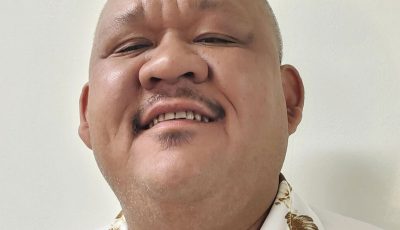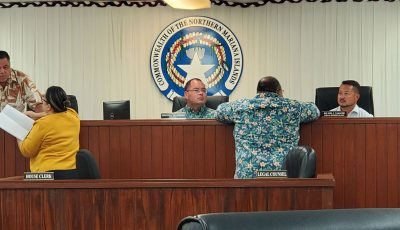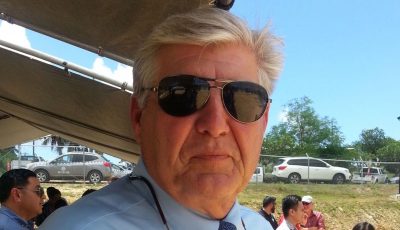Senate, House adopt different dates for SOCA
Oct. 31 or Dec. 1? That is the question. The date as to when Gov. Ralph DLG Torres will deliver his State of the Commonwealth Address remains up in the air as both the House of Representatives and Senate cannot agree on a specific date and venue.
The Senate and the House adopted yesterday morning separate resolutions to call for a joint session of the Legislature to receive Torres’ SOCA, with the Senate agreeing to Torres’ request to hold the SOCA at the Kensington Hotel Saipan on Oct. 31. The House, however, wants the SOCA held in the House chamber on Dec. 1.
The Senate was the first to adopt their joint resolution during a regular session.
With seven senators, including Sen. Edith E. DeLeon Guerrero (D-Saipan), voting “yes,” Sen. Teresita A. Santos (Ind-Rota) abstaining, and Sen. Paul A. Manglona (Ind-Rota) absent, the Senate adopted Senate Joint Resolution 22-13.
Manglona was present during the start of the session, but he did not come back after Sen. Victor B. Hocog (R-Rota) figured in a shouting match with Fabian M. Indalecio during a public comment portion of the session.
With 15 House members voting “yes” and five minority members voting “no,” the House adopted House Joint Resolution 22-18.
The House minority members are Reps. Angel A. Demapan (R-Saipan), Roy Christopher A. Ada (R-Saipan), Joseph A. Flores (Ind-Saipan), Joseph Lee Pan T. Guerrero (R-Saipan), and Patrick H. San Nicolas (R-Tinian).
Before the voting at the Senate, Senate President Jude U. Hofschneider (R-Tinian) accused Manglona of “trying to stay relevant” when this is really a simple request by the governor to have a joint session to deliver SOCA, which all senators are responsible and not just him.
Hofschneider, who is the author of Senate Joint Resolution 22-13, said he is hoping that Manglona will come up with a legislation designating a specific time of the year.
He urged Manglona to introduce a legislation so they don’t have this impasse.
In clarifying the chain of events with regard to the Senate joint resolution, the president said with typical SOCA, the governor would usually advise the presiding officers to call for a joint session, which many members of the Legislature and the public know did not happen in this matter.
He said the moment Torres started inviting members of the Legislature and the public to hold a SOCA on Oct. 21, there was a concern that the legislature was not informed.
Hofschneider said the governor rescheduled it and submitted a letter to him and House Speaker Edmund S. Villagomez (Ind-Saipan).
He said he took the opportunity to introduce Senate Joint Resolution 22-13 to attest to the governor’s request to call for a joint session to receive his SOCA on Oct. 1 at Kensington Hotel.
Hofschneider said he pre-filed the joint resolution on Oct. 19, but later he learned that Rep. Ralph Yumul (R-Saipan) pre-filed the following day, Oct. 20, House Joint Resolution 22-18 to call for a joint session to receive SOCA on a different date, Dec. 1.
Hofschneider said he believes the governor was just trying to provide more clarity of the state of the Commonwealth “as far as where we’re at today,” irrespective of the date.
Hofschneider urged Manglona to come up with a legislation that designates a time during the month of every year so it doesn’t matter who the governor is, he or she must report in a joint session.
“Because right now, it’s very vague. Everybody wants to do it at a certain time,” he said.
The president noted that Manglona was absent the whole time when the Senate tackled and resolved biggest responsibility of a member of the Legislature—the fiscal Year 2023 government’s budget.
“Out of touch, out of sight. Now he wants to be relevant in this joint resolution,” Hofschneider said.
Manglona said Sunday that Hofschneider’s memorandum issued that day at 7am calling for a Senate session yesterday at 8am not only violates the Open Government Act, but is also an obvious move that the Senate is “racing” to hold a session before the House holds its session yesterday at 9am.
Hofschneider said yesterday at the session that it’s not about trying to observe whose joint resolution is greater than the other, but about allowing for that platform for the chief executive to deliver SOCA.
“And I’m surprised that some of us here in the Legislature, when there’s other public functions like graduation of our hardworking frontliners at some of these private areas, no one’s complaining,” he said.
The president said a couple of weeks ago, some of the lawmakers were at the Pacific Islands Club for a public event. Hofschneider said PIC is a private venue, but no one’s complaining about public funds and all of that.
“But when this thing [SOCA] comes up, now everybody’s up in arms that we should do it here,” he said.
The president said early voting for the general election is going to start in a couple of weeks at the Pedro P. Tenorio Multi-Purpose Center, where the SOCA is usually held.
“For the interests of the general public, it doesn’t matter what color you are, who you are, what party you are. Allow the governor to report to us whether you agree with him or not,” Hofschneider said.
In response to Hocog’s question as to what will happen if the Senate and the House adopt a joint resolution for different dates, Senate legal counsel Antonette Villagomez said in order to have a joint session, both houses have to adopt a resolution.
“So if the Senate joint resolution is adopted by the Senate and not adopted by the House, then we cannot have a joint session,” she said.
In response to Sen. Francisco Cruz’s (R-Tinian) request for clarification, Villagomez said in the past, the governor would submit a letter to the Legislature, requesting a joint session at a specific date. She said a joint session is the purview of the Legislature so the date will depend on when the members of both houses are available.
“So in fact, both the House and Senate and the governor would talk about the date when everyone will be available,” the counsel said.
Cruz said he wants to completely understand who has the authority to set date and time when the governor should present the SOCA.
“Because in my opinion, if a person is reporting something, then he shall set the date and time,” the senator said.
DeLeon Guerrero said it is fair that the person that’s going to deliver SOCA obviously should be the one who set a date. DeLeon Guerrero said one thing that was not specifically mentioned is the location.
“I wouldn’t think that SOCA is a private function. And therefore, I have concerns about choosing of the venue to deliver the SOCA,” she said.
The senator said she believes the venue of SOCA should be in a public facility.
Santos told Saipan Tribune that she abstained from voting because there’s so many issues surrounding the date, time, and venue of the SOCA. Santos suggested that Hofschneider and Villagomez meet to address those issues to facilitate the adoption of a joint resolution and call for a session to receive the governor’s SOCA.
During discussions of the House Joint Resolution 22-18, Demapan for the rationale behind the drastically different SOCA dates. “So just wondering…how did we came up with this date?” he asked, referring to the Dec. 1 date.
Yumul said the House leadership met last week and decided that it will be fair for the Commonwealth to receive the SOCA after the Nov. 8 general elections.
“The members decided on different dates; however, because it is going to be a public event, the Multi-Purpose Center was placed on hold for until…early December,” Yumul said.
Demapan said they know the governor had scheduled a SOCA previously without a joint session and several members of the Legislature and in the community have expressed concern about not having a joint session convened.
“So that’s was the reason behind the rescheduling and the reason behind the submission of governor’s communication 22-171. But it’s a little bit confusing about how the date has just drastically changed,” he said.
Demapan said one of the concerns they have is there has been no SOCA for a couple of years now and traditionally, it is delivered sometime in May or April of each year.
“So we’re already far exceeded that time for that traditional timeline. And to further move it back to December is a little bit concerning and confusing to some,” he said.
Rep. Christina E. Sablan (D-Saipan) said there is a reason why traditionally SOCAs are normally held earlier on in the year, that even for the U.S. president when he or she gives State of the Nation Address before the Congress, those remarks are usually made in January or February.
“There is a reason why we don’t wait until the very last minute in an election year right before the election to deliver a SOCA and that is because of an obvious appearance of impropriety of politicking on taxpayer dime,” Sablan said.
She said the decision was made in the House leadership to hold SOCA in a public and accessible and cost-effective venue.
“Stream it live and to receive the address. But to do so, after all the dust has settled, after the election is over when the venues are available. Let’s just be honest colleagues, there really isn’t any real urgency in sharing the SOCA,” Sablan said.



























